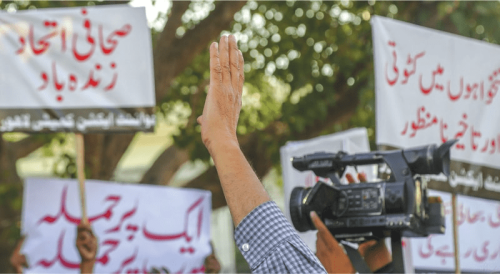ISLAMABAD: A new Unesco report has revealed that the misuse of financial crimes to target and silence independent media and journalists is on the rise globally.
The report, titled ‘The Misuse of Financial Laws to Pressure, Silence and Intimidate Journalists and Media Outlets’, says financial crimes prove effective in silencing media and journalists as they do not require the need for a link to content produced and are not subjected to the same international scrutiny as laws explicitly targeting media.
The report, a part of the Unesco series ‘World Trends in Freedom of Expression and Media Development’, notes that they also cause irreparable harm to the reputation of a journalist or media outlet and — forced to pay high legal fees and fines — they are rendered no longer financially viable. Given their effectiveness, their use is a strategic choice on the part of those bringing the charges, it says.
Noting key trends, the report says the use of specious allegations based on financial laws to silence independent journalists and media outlets is becoming more widespread and frequent, with a chilling effect on freedom of expression.
Use of financial charges forces self-censorship, creates chilling effect on freedom of expression
Of the 120 cases of such allegations reviewed for the report, spanning 2005-2024, 60 per cent occurred between 2019 and 2023, pointing to a sharp increase in the use of these allegations against journalists. Since this is an increasingly new phenomenon with significant under-reporting, the actual number of cases is likely to be higher.
Among the cases reviewed, at least 56 contain charges of alleged extortion, with the majority arising being in Asia and the Pacific, and Eastern Europe and Central Asia. Tax evasion and money laundering are the second and third most misused charges brought against journalists and media outlets.
In Asia and the Pacific, 44 cases were reviewed, many of which involved groups of journalists being jointly charged. In those cases, tax evasion or tax fraud, extortion, money laundering, and illegally receiving foreign funds were the most frequently used charges. The earliest five cases were recorded in 2005, but over half of these cases took place in the last four years (2020-2024).
In 20 cases, multiple charges were brought, and in 23 cases, journalists were held in pre-trial detention, with jail terms of between five and 15 years being issued in seven cases.
The complexity of legal cases related to financial crimes requires access to tax and other legal expertise, which is often out of reach to independent journalists and media outlets.
Increasingly, groups of journalists are jointly charged, and the defendants often face multiple charges simultaneously.
Such harassment frequently comes during times of protests and electoral campaigns and is part of a wider crackdown to silence critical voices as well as ahead of hosting major international events for which a country and government will come under increased international public attention.
Commonly brought alongside other charges and indicative of the widespread use of lawfare to target independent media and journalists, the use of financial charges drives self-censorship.
They typically require expensive specific legal expertise to understand the complex nuances of tax law and in many instances, these allegations take place over protracted periods, with the prospect of additional charges being brought against those already facing similar allegations.
Those seeking to defend journalists and media are increasingly finding themselves subject to the very same threats. In many instances, lawyers defending clients facing charges are also subject to judicial harassment of this type, so they also need protection, the report says.
The report says there is a gap in those mechanisms built to fight corruption. Many anti-corruption conventions and tools are considered ineffective in offering protection to journalists and even misused to target journalists covering corruption.
The report urged the states to follow the recommendations of the Financial Action Task Force (FATF) and Financial Accountability, Transparency and Integrity (FACTI) on the proportionate use of anti-corruption laws.
FATF should establish accountability mechanisms to ensure anti-corruption measures are applied proportionately and with respect to human rights and freedom of expression.
Unesco Director-General Audrey Azoulay stated that journalists play an essential role in society, investigating wrongdoing and advancing transparency. They should never be targeted with unfounded allegations of financial crimes or subject to legal harassment to silence them.
Published in Dawn, October 28th, 2024













































Dear visitor, the comments section is undergoing an overhaul and will return soon.